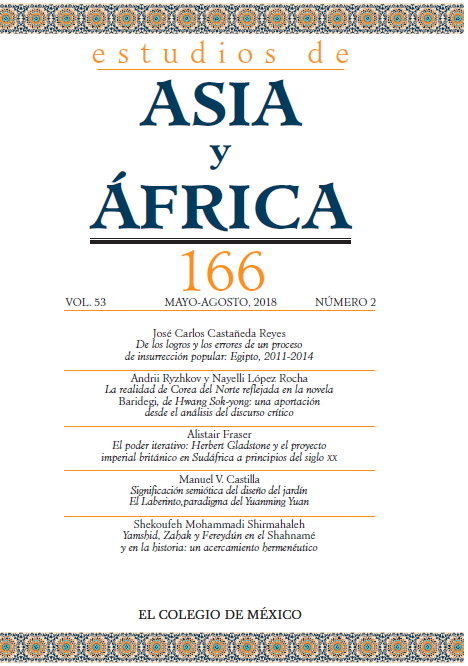Resumen
El artículo ofrece una visión de la realidad de Corea del Norte reflejada en la novela Baridegi, de Hwang Sok-yong. Se hace un seguimiento detallado de términos y expresiones específicos que se reproducen en la novela. Esas expresiones funcionan como indicadores que alertan a los lectores sobre un contexto más amplio que incluye los derechos humanos y las relaciones sociales en la República Popular Democrática de Corea. Por lo tanto, se evalúan las implicaciones de los términos y las expresiones relacionados con ese país utilizando el análisis del discurso crítico y vinculándolos a hechos descritos en documentos oficiales. Se estima que este análisis contribuye a percibir el fondo de la novela y sus contextos subyacentes desde un ángulo específico.
Referencias
Aslani, Mahdi y Salmani, Bahloul, “Ideology and Translation: A Critical Discourse Analysis Approach towards the Representation of Political News in Translation”, International Journal of Applied Linguistics and English Literature, vol. 4, núm. 3, 2015, pp. 80-88.
Baker, P., Gabrielatos, C., Khosravinik, M., Krzyżanowski, M., McEnery, T., y Wodak, R., “A useful methodological synergy? Combining critical discourse analysis and corpus linguistics to examine discourses of refugees and asylum seekers in the UK press”, Discourse & Society, vol. 19, núm. 3, 2008, pp. 273-306.
Bassnett, Susan, Translation Studies, Londres y Nueva York, Routledge, 2005.
Becker, Jasper, Rogue Regime: Kim Jong Il and the looming Threat of North Korea, Nueva York, Oxford University press, 2005.
Beller, Manfred. “Perception, image, imagology”, en Imagology: The Cultural Construction and Literary Representation of National Characters: a Critical Survey, Manfred Beller y Joep Leerssen (eds.), Amsterdam – Nueva York, Rodopi, 2007, pp. 3-16.
Ciapello, Eve y Fairclough, Norman, “Understanding the new management ideology: a transdisciplinary contribution from critical discourse analysis and new sociology of capitalism”, Discourse & Society, vol. 13, núm. 2, 2002, pp. 185-208.
Fairclough, Norman, “Critical discourse analysis”, International Advances in Engineering and Technology, vol. 7, 2012, pp. 452-487,
[www.scholarism.net/FullText/2012071.pdf, consultado en enero de 2017.]
Grenier, Yvon, “Milan Kundera on Politics and the Novel”, History of Intellectual Culture, vol. 6, núm. 1, 2006, pp. 1-18.
Human Rights Watch, “North Korea: Private Commerce Brings Arbitrary Arrests, Abuse”, Human Rights Watch, junio 7, 2015, [www.hrw.org/news/2015/06/07/north-korea-private-commerce-brings-arbitrary-arrests-abuse, consultado en enero de 2017.]
Hunter, Helen-Louise, Kim Il-song's North Korea, Westport, Connecticut, Londres, Praeger, 1999.
Hwang, Sok-yong, Baridegi, Seúl, Changbi Publishers, 2007.
Kim, Insook, “The national problem in Baridegi by Hwang Seok-young”, The Journal of Korean Studies, vol. 41, junio de 2012, pp. 163-193.
Kim, Jae-young, “The Recognition of Post-modernism and the form Character of Hwang Sok-yong’s Novel “Baridegi”, Urimalgeul: The Korean Language and Literature, vol. 55, 2012, pp. 267-288.
Kim, Kyung Hye, “Examining US news media discourses about North Korea: A corpus-based critical discourse analysis”, Discourse & Society, vol. 25, núm. 2, 2014, pp. 1-24.
Kim, Kyung Hyun, “Mea Culpa: Reading the North Korean as an Ethnic Other in Recent South Korean Films”, Situations: Cultural Studies in the Asian Context, vol. 2, 2008, pp. 48-74.
Kim, Mike, Escaping North Korea: Defiance and Hope in the World’s Most Repressive Country, Lanham, Rowman & Littlefield Publishers, 2008.
Kim, Young, “Analysis and Numbering Interpretation on the ideology of Hwang Suk-Young and Lee, Moon-Yeol’s novels: Comparative studies of Hwang and Lee’s novels – focusing on the analysis of ideology”, Journal of North-East Asian Cultures, vol. 26, 2011, pp. 187-209.
Kirby, Michael Donald; Darusman, Marzuki y Biserko, Sonja, Report of the detailed findings of the commission of inquiry on human rights in the Democratic People’s Republic of Korea, A/HRC/25/CRP.1, Ginebra, United Nations Human Rights Office of the High Commissioner, 2014.
Ko, In-Hwan, “A study on new type of North Korean refugees formulation – Focused on ‘Border-crossing imagination’ in the “Baridegi (Origin of shaman)” and “Rina”, Theses on Korean Literature, vol. 52, agosto de 2009, pp. 215-245.
Kundera, Milan, The Art of the Novel, trad. Linda Asher, Nueva York, Grove Press, 1988.
Lankov, Andrei, “The evolution of North Korea’s ‘inminban’”, NK News, abril 28, 2015, [www.nknews.org/2015/04/the-evolution-of-north-koreas-inminban/, consultado en enero de 2017.]
Lankov, Andrei, The Real North Korea: Life and Politics in the Failed Stalinist Utopia, Nueva York, Oxford University Press, 2015.
Leerssen, Joep, “Imagology: History and method”, en Imagology: The Cultural Construction and Literary Representation of National Characters: a Critical Survey, Manfred Beller y Joep Leerssen (eds.), Amsterdam – Nueva York, Rodopi, 2007, pp. 17-32.
Lim, Jeongsub y Seo, Hyunjin, “Frame flow between government and the news media and its effects on the public: Framing of North Korea”, International Journal of Public Opinion Research, vol. 21, núm. 2, 2009, pp. 204-223.
Park, Dukkyu, “Defector fiction”, A Literary Quarterly, vol. 26, invierno de 2014, pp. 25-26.
Park, Jinim, “Historical Truth and Literary Representation”, Journal of American Studies, vol. 36, núm. 3, 2004, pp. 83-101.
Periscope, “Princess Bari”, Periscope, [www.periscopebooks.co.uk/princess-bari/, consultado en enero de 2017.]
Philips, Tom, “Escape from North Korea: ‘How I escaped horrors of life under Kim Jong-il’”, The Telegraph, noviembre 11, 2014, [www.telegraph.co.uk/news/worldnews/asia/northkorea/11138496...-North-Korea-How-I-escaped-horrors-of-life-under-Kim-Jong-il.html, consultado en enero de 2017.]
Shin, Chul Ha, “An Analytic adventure of “Baridegi”, The Journal of Korean Studies, vol. 30, junio de 2009, pp. 189-211.
Stallings, Bethany Ann, “Discourse of Defection: Political Representation of North Koreans”, Tesis de Maestría, Southern Illinois University Carbondale, 2013.
The Economist, “Deprive and Rule”, The Economist, septiembre 7, 2011, [www.economist.com/node/21529063, consultado en enero de 2017.]
Tolson, Andrew, Mediations: Text and Discourse in Media Studies, Londres, Arnold, 1996.
Wanta, Wayne; Golan, Guy y Lee, Cheolhan, “Agenda setting and International News: Media Influence on Public Perceptions of Foreign Nations”, Journalism and Mass Communication Quarterly, vol. 81, núm. 2, 2004, pp. 364-77.
Wodak, Ruth y Meyer, Michael, “Critical discourse analysis: history, agenda, theory and methodology”, en Methods of Critical Discourse Analysis, Ruth Wodak y Michael Meyer (eds.), Los Ángeles – Washington DC, Sage, 2009, pp. 1-34.
Zhu, Yuchao, “Making Sense of Canada's Public Image in China”, Journal of American-East Asian Relations, vol. 20, 2013, pp. 269-85.
Esta obra está bajo una licencia internacional Creative Commons Atribución-NoComercial-SinDerivadas 4.0.
Derechos de autor 2022 Estudios de Asia y África


